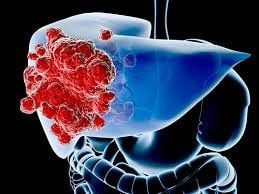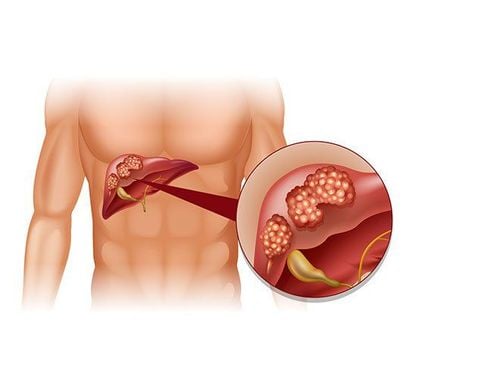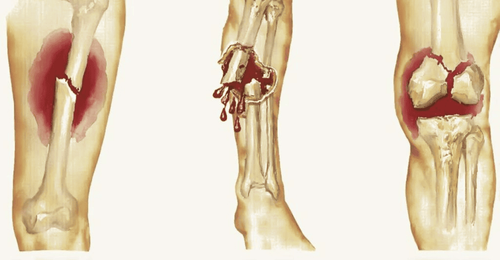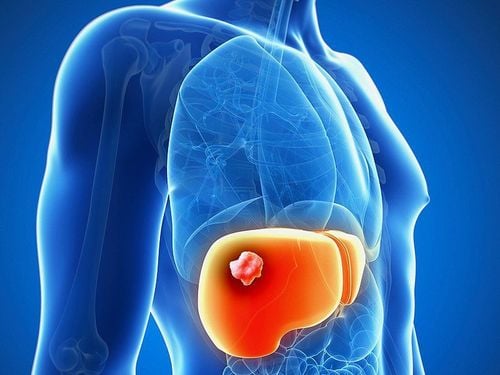This is an automatically translated article.
In recent years, liver cancer is growing strongly and becoming the leading cause of cancer death. Learn the types of liver cancer as well as the stages of disease development to prevent.1. Liver cancer
Liver cancer is the rapid growth and spread of unhealthy cells in the liver. Your liver is the largest organ in your body. It helps to remove toxins in the blood from your body. It also plays a role in food digestion and energy storage. When those cells become cancerous, the liver cannot function properly, leading to harmful and serious effects on the body.2. Classification of liver cancer
Classification for liver cancer is usually based on the place of onset. It is divided into two ways: primary hepatocellular carcinoma and secondary hepatocellular carcinoma.2.1 Primary hepatocellular carcinoma Hepatocellular carcinoma Hepatocellular carcinoma is the most common type of cancer, it accounts for 80% of all cancers, usually develops strong in people 50 years of age and older. It is estimated that men are twice as likely to suffer from the disease as women.
Hepatocellular cancer after starting in the liver, they will progress very quickly, dangerously can cause the patient to die in just 6 months. And metastasis occurs more often in tumors that have an infiltrate pattern, often spreading along the blood stream to the lungs, to the bones, and to the kidneys in the adrenal gland...
Cholangiocarcinoma Tumor develops from cholangiocarcinoma, this type of cancer is common in patients with primary sclerosing cholangitis, long-standing gallstones, parasitic infections...
Hepatoblastoma Cancer type This is common in children no more than 4 years old, the disease progresses due to the abnormal development of genes. With advances in medicine, the treatment of this disease has brought many good results.
Liver cancer vascular sarcoma This is a malignant vascular sarcoma that is often detected late, often seen in people over 60 years of age. Common symptoms of right upper quadrant pain, hepatomegaly, splenomegaly, anemia, peritoneal effusion...
Liver cancer metastases from other visceral areas Secondary cancer of this type is often called the name of the original cancer organ. head .
2.2 Secondary liver cancer Secondary liver cancer, also called metastatic liver cancer, is much more common than primary hepatocellular carcinoma. Cancer of the colon, rectum, lung or breast can metastasize to the liver.

Người ta chia ra hai cách phân loại là: ung thư tế bào gan nguyên phát, ung thư tế bào gan thứ phát
3. Stages of liver cancer
The stages of liver cancer are classified so that the treating doctor can better understand the patient's condition as well as the patient's condition. From there, to have a treatment plan, appropriate treatment regimen for the patient.3.1 Liver cancer is classified into stages Tumor section: First, when diagnosing hepatocellular carcinoma, it is necessary to find the growth of tumors: number, size, no hemangioma, tumor involved or Is it invasive?, assessed by T score.
Nodal section: Assess whether cancer has spread to nearby lymph nodes?, assessed by N score.
Metastatic section: Finally, when there is any metastasis Any tumor, or invasion to other areas and parts of the body, is rated by an M score. Each part has a score of 0 - 4:
Score 0 - 4 based on increasing severity Rating X is : no rating due to insufficient information base. Scores M, N, and T are the scores for each stage of tumor change. The staging system of hepatocellular carcinoma is classified mainly based on the extent of tumor spread:
In stages between stage I and stage II: the tumor is likely not to have spread, is still in liver
At stage III divided into 3 detailed sections A, B, C: showing different locations and sizes of tumors. In each of these stages, the tumor is likely to spread to the blood vessels, lymph nodes, and nearby organs.
In stage IV: the tumor is likely to spread outside the liver or spread throughout the liver.
3.2 Different stages of hepatocellular carcinoma Determine the combined M, N, and T scores for the overall view of each stage of the cancer.
Stage I: M0, N0, T1: Appears a single mass of undetermined size, and has not invaded blood vessels, has not spread to neighboring lymph nodes as well as many other areas.
Stage II: M0, N0, T2: A single mass of undetermined size appears but has grown invasively into blood vessels. Or more than 1 tumor no more than 5cm in size. They have not spread to nearby lymph nodes or many other regions.
Stage IIIA: M0, N0, T3a: Appears more than 1 tumor, each tumor is at least 5cm in size. The tumor has not yet invaded nearby lymph nodes or metastasized.
Stage IIIB: M0, N0, T3b: At least 1 tumor has appeared, has grown to 1 main branch of the intrahepatic vein. They have not invaded to nearby lymph nodes or metastasized outside.
Stage IIIC: M0, N0, T4: There is an advanced tumor that invades the nearby outer parts of the gallbladder, or there is a tumor that has grown into the outer sheath surrounding the liver. But has not yet grown to the lymph nodes or metastasized outside.
Stage IVA: M0, N1, any T: There is a tumor of any size and number, it may have invaded blood vessels, lymph nodes or nearby areas. The tumor has not metastasized outside.
Stage IVB: M1, any N, any T: Tumor of any size or number, has grown to other parts of the body.
Patients with hepatocellular carcinoma often have liver dysfunction caused by cirrhosis, and doctors will check how the remaining liver is working. Using score bars to measure intra-abdominal fluid, blood fluid, and brain function is the most effective way to classify hepatocellular carcinoma due to cirrhosis.
Classification of each stage of cancer helps the doctor to plan the most suitable and best treatment plan for you. If you do not understand, you should ask the treating doctor directly to explain each stage of the disease you are experiencing as well as your current health situation.

Phân loại từng giai đoạn của ung thư giúp bác sĩ có thể lên phác đồ điều trị phù hợp và tốt nhất
Customers can register for the Liver Cancer Screening Package at Vinmec International General Hospital, this is a prestigious address for liver cancer screening and screening as well as all procedures are carried out. by qualified, experienced doctors, ensuring absolute satisfaction for you and your loved ones.
Please dial HOTLINE for more information or register for an appointment HERE. Download MyVinmec app to make appointments faster and to manage your bookings easily.









![[Video] Don't be subjective with gallstone disease](/static/uploads/small_20191104_030711_425223_soi_omc_max_1800x1800_jpg_2e7a54defa.jpg)



